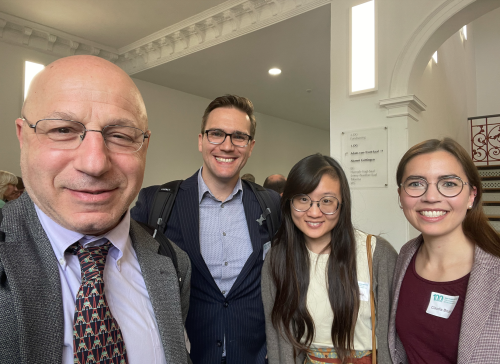Photos courtesy of Howard Stone
By Alaina O'Regan
August 4, 2025
Howard Stone, a pioneer in fluid dynamics research, was an invited speaker at the 100th anniversary celebration of the Max Planck Institute for Dynamics and Self-Organization in Göttingen, Germany in July.
Stone, the Neil A. Omenn ’68 University Professor of Mechanical and Aerospace Engineering, has been widely recognized for his research in fluid dynamics and its applications at the interface of engineering, chemistry, physics and biology. His work in the field of microfluidics, which deals with the manipulation of fluids at the microscale, has laid the groundwork for lab-on-a-chip technologies that enable rapid diagnostics and chemical analysis. He has also developed models to improve water purification, and has advanced understanding of microorganism movement and biofilm behavior, which has important applications in health and disease control.
The Max Planck Institute for Dynamics and Self-Organization, originally founded as the Kaiser Wilhelm Institute for Fluid Dynamics, is one of the major centers for fluid mechanics research in the world, according to Stone. In the past century it has expanded to sponsor research across physics, chemistry, engineering and biology. It was renamed in 2004 as part of the Max Planck Society, Germany’s premier, non-university research organization dedicated to fundamental research across 84 institutions.

Stone was one of two researchers, along with Christina Marchetti, a professor at the University of California Santa Barbara, invited to give a research talk at the ceremony. Other speakers included Patrick Cramer, the president of the Max Planck Society and Petra Broistedt, the mayor of Göttingen.
Stone is a fellow of the American Physical Society and is past chair of the APS Division of Fluid Dynamics. In 2008, Stone was named the first recipient of the G.K. Batchelor Prize in Fluid Dynamics, and he was the 2016 recipient of the APS Fluid Dynamics Prize. He is an elected member of the National Academy of Engineering, the American Academy of Arts & Sciences, the National Academy of Sciences, the Royal Society of the U.K. and the American Philosophical Society. He is currently on the editorial or advisory boards of the journals Physical Review Fluids, Langmuir, and Soft Matter. He also is co-editor of the Soft Matter book series.
Stone received a B.S. in chemical engineering from the University of California Davis in 1982 and a doctorate in chemical engineering from Caltech in 1988. He then spent a postdoctoral year in the Department of Applied Mathematics and Theoretical Physics at the University of Cambridge before joining Harvard. He joined Princeton in 2009 as the Donald R. Dixon ’69 and Elizabeth W. Dixon Professor in Mechanical and Aerospace Engineering.